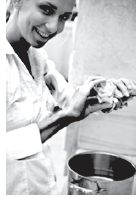Unit-AL Maceió 2016

needed for muscle and nerve activity. Salt (sodium
chloride) is the main source of sodium in the UK diet,
5 but the majority of us eat much more salt than we need.
Eating too much salt over time is linked with high-blood
pressure, which can lead to serious problems such as
heart disease or stroke.
On average, adults in the UK eat about 8.1g of salt
10 (3.2g sodium) a day. This may not sound like much, but
to reduce the risk of high blood pressure, it is
recommended that adults should not be eating more than
6g of salt (2.4g sodium) a day.
Salt intakes should be much lower than this for
15 babies and children. Babies under 12 months old should
have less than 1g of salt a day. The daily recommended
maximum amount of salt children should eat depends
on their age:
1 to 3 years – 2g of salt a day (0.8g sodium)
20 4 to 6 years – 3g of salt a day (1.2g sodium)
7 to 10 years – 5g of salt a day (2g sodium)
11 years and over – 6g of salt a day (2.4g sodium)
As salt is often a ‘hidden’ ingredient in many foods,
it can sometimes be difficult to work out how much you
25 are eating. Some foods, such as crisps, olives, cheese
and bacon, taste obviously salty but other foods can
contribute a lot of salt to our diet without us realizing.
The salt we add during cooking and at the table
makes up only a small amount of salt in our diets. Around
30 75% of the salt we eat comes from ready-made and
processed foods, such as bread, breakfast cereals, soups
and baked beans. Even sweet things, such as biscuits,
can have salt added to them.
To keep track of your salt intake, get into the habit
35 of reading the nutritional information on food labels, where
you will find the salt content for a 100g serving. Try to eat
those foods that are high in salt less often or in smaller
amounts. As a rough guide:
a high amount of salt is more than 1.5g per 100g
40 a low amount of salt is 0.3g per 100g
Effervescent vitamin supplements or effervescent
painkillers can contain up to 1g of salt per tablet. Consider
changing to a non-effervescent tablet, particularly if you
have been advised to watch or reduce your salt intake.
45 Talk to your GP about alternatives if you have been
prescribed these medicines.
HOW much salt is good for me?. Disponível em: <www.nhs.uk/chq/pages/1138.aspx?CategoryID=51>. Acesso em: 12 out. 2015.
Fill in the parentheses with T (True) or F (False).
It’s stated in the text:
( ) Lots of people can do without sodium on an everyday basis.
( ) British adults’ salt intake is usually higher than the recommended amount.
( ) The salt added during cooking is seen as the prime villain of people’s overdose intake.
( ) Too much salt consumption is believed to increase the risk of heart diseases.
The correct sequence, from top to bottom, is
T T T T
F T F T
F T T F
T F F T
T F T F
E mais: nota TRI a todo o momento.





